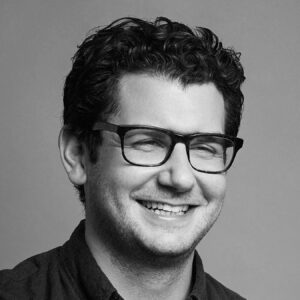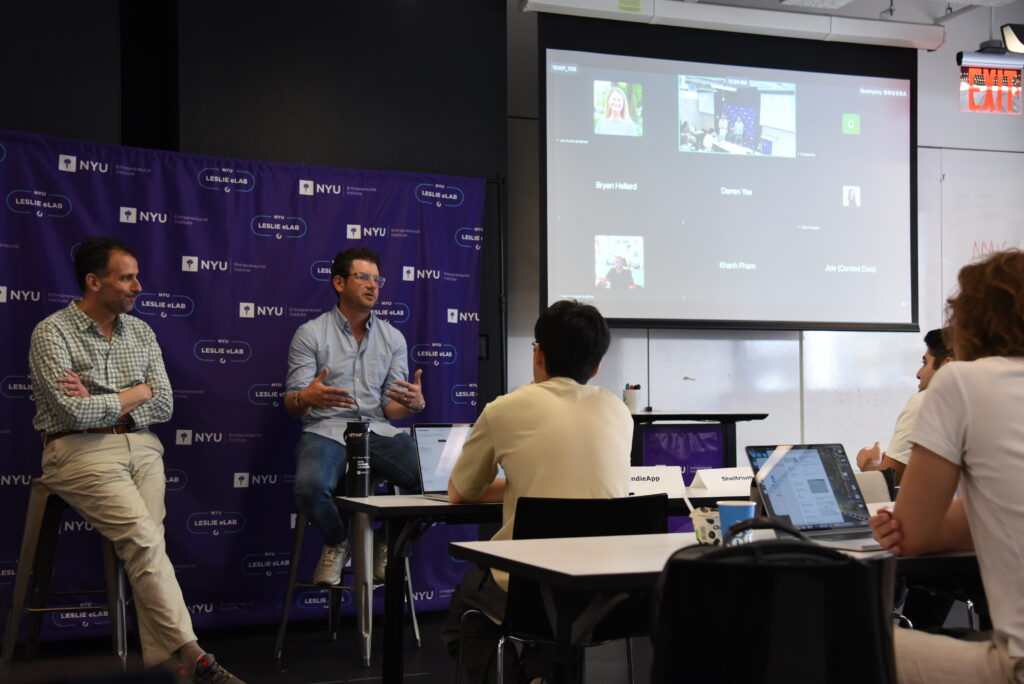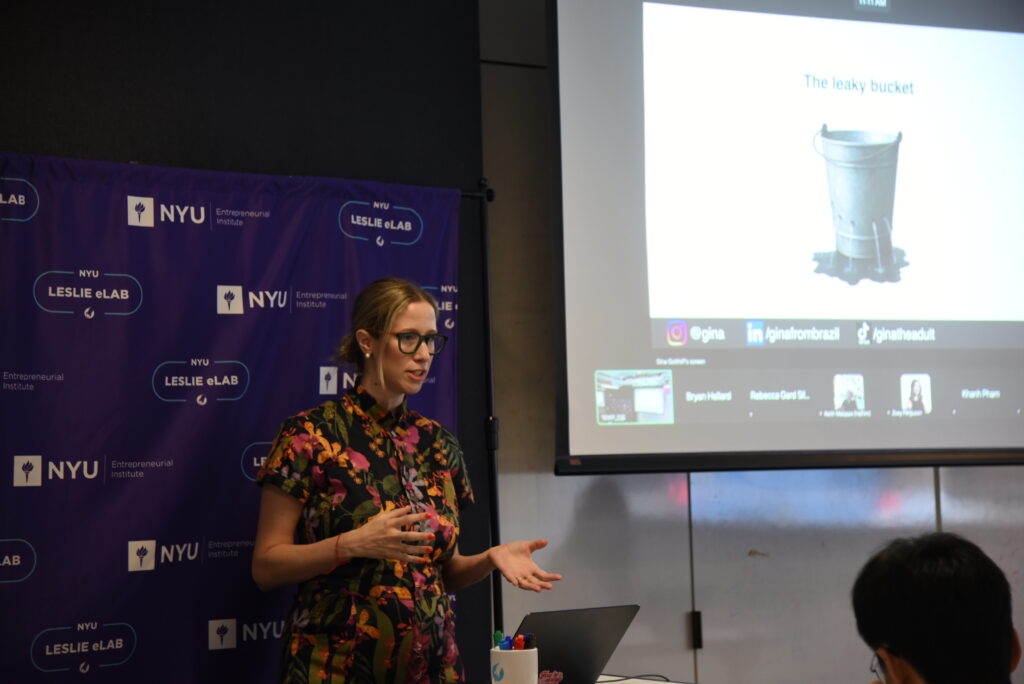Stay up to date on upcoming events, deadlines, news, and more by signing up for our newsletters!
During the Week 3 of the 2025 Summer Launchpad (SLP), teams transitioned from early ideation to refining their business strategies based on direct investor feedback. Through targeted workshops and collaborative discussions, founders honed their ability to articulate customer journeys, identify effective execution strategies and develop tactics to acquire and retain users.
Week 3 Recap:
Mock Investor Board Meetings
June 24 marked the first of three mock investor board meetings during the Summer Launchpad. Each startup was matched with a handpicked board of early-stage investors who will serve as mentors throughout the summer. These 90-minute sessions are structured like real-world investor meetings — complete with memos and pitch decks — but prioritize clarity and strategic insight over polish. It’s a high-pressure environment that pushes teams to sharpen communication, receive targeted feedback and build investor-ready instincts.
A Few of Our SLP Founders on the Value of Mock Investor Board Meetings:
"It was incredibly helpful to talk through different aspects of our business and product with investors in a low-stakes setting. Getting feedback from people who are thinking with an investor mindset — and hearing different viewpoints from different investors — was so valuable as we continue to refine our approach." — Gaby Berne (Langone Clinician), Co-Founder & CEO of MoveMend
“The mock board meeting was a great checkpoint it pushed us to clarify our POC process, tighten our GTM strategy, and think deeper about execution.” — Sai Dhruv (SPS ‘26), Founder & CEO of Twinning AI
"We truly got matched with the perfect investor mentors for our unique startup! Not only did they clearly understand our mission and help push us towards a more viable MVP, but I was also invited to present in person and got to visit Venrock Ventures myself. The feedback was unfiltered, poignant, and ultimately grounded us is the most feasible mission-aligned direction which has motivated us to push forward with even more excitement!" — Zoey Ferguson (Tisch ITP ‘25), Founder & CEO of Sheltrium
Workshop: Product Management
On June 25, Chris Lysiuk (Tandon ‘17), senior product manager at Gusto, led a workshop that broke down the core of product management as the intersection of customer needs, business impact and technical feasibility. In the early stages of a startup, success depends on talking to users, incorporating first-hand feedback and executing with intention.
Lysiuk cautioned against common startup pitfalls — especially overbuilding technical solutions without validating them through marketing and minimum viable product (MVP) testing. He shared examples of teams that spent months developing overly complex platforms that ended up as little more than “glorified Google Drives.” He also highlighted a case from Gusto, where the company pivoted from focusing on invoice reminders to solving deeper payment flexibility needs — a shift that took eight weeks and nine engineers but delivered meaningful customer value.
Lysiuk on Product Management:
“Everyone is a product manager. Whether you're the founder, whether you're in marketing, whether you're in design, all individuals within your company right now should wear the product management hat.”
Ask-Me-Anything Session with Rich Fulop (SPS ‘07, Stern ‘14), Co-Founder & Former CEO of Brooklinen
Later that Wednesday, the founders were joined by Rich Fulop of Brooklinen — the direct-to-consumer bedding and home essentials brand that became one of New York City’s most iconic startups. Fulop shared the origin story of launching Brooklinen in 2014 with a $50,000 Kickstarter and a clear mission: to offer high-quality sheets to young professionals at an accessible price.
He delivered a masterclass in scrappy, customer-driven growth — from hand-delivering 50 sample boxes to editors (which inspired 30 news stories) to experimenting with focused marketing channels like subway ads, bus wraps, and even Grindr. Fulop emphasized the power of personal connection, highlighting how weekly update emails, yearlong trials and personalized support helped build trust.
As an SPS and Stern alum, Fulop’s connection to NYU ran deep. He built his early team directly from the NYU job board, much like many SLP founders today. Rather than hiring polished MBAs, he prioritized junior talent eager to grow with the brand.
Fulop on Staying Close to Customers:
“The name of my game became: how do I hang around these people as cheaply as possible, until they're ready to pull the trigger? And again, you talk to customers. You go out there. You learn about what those triggers are.”
Workshop: Customer Acquisition Strategy
The SLP teams gained invaluable insights into growth marketing during a hands-on workshop led by Eventbrite's VP of Growth Marketing Ashley Blackmon. Drawing from her leadership experience at Restream, Pathstream, and Zillow Group, Blackmon walked the teams through key strategies for acquiring and retaining customers — from crafting effective messaging to optimizing marketing channels. Her real-world examples and actionable frameworks gave founders a clear roadmap for driving early traction and sustainable growth.
Workshop: Customer Acquisition Tactics
Gina Gotthilf, former VP of growth at Duolingo & founder of Outsmart College, closed out the week's workshops with a deep dive into her playbook for acquiring and retaining users.
In the pre-launch phase, Gotthilf emphasized the importance of building founder credibility and cultivating an early audience through humor, surprise, a clear brand voice and authentic community engagement. She introduced the “surround sound effect” — securing multiple media mentions in a short window — and encouraged founders to position their product around a broader mission, not just its features.
Once the product is live, the post-launch focus shifts to optimizing the user acquisition funnel — from app store optimization to mobile-friendly landing pages that clearly communicate value and drive action.
For retention, Gotthilf shared lessons from Duolingo’s success, including gamification, emotional design (yes, even a crying owl) and a seamless onboarding experience. Because real growth isn’t just about getting users, it’s about keeping them.
Gotthilf on Key Growth Marketing Principles:
“You’re selling a vision. You’re selling a world that’s a better place. You’re selling a movement that everyone wants to be a part of. And that changes everything.”
Stay tuned for more updates from SLP as the teams continue developing their ideas!












